Entering into the 21st century, the entire world has been plunged into a maelstrom of change. While harboring high hopes for new technologies, people are losing their bearings with the severe changes in social structures. In such an era, it is necessary to analyze and evaluate matters from a new and multi-dimensional perspective and hold a multi-faceted evaluation of the different dimensions of society, not only in terms of developing scientific technologies and business analyses, but also in terms of giving consideration to the environment, politics, education, the arts and culture. Multi-cultural venues for dialogue and academic exchange is now most necessary.
The Sekiguchi Global Research Association (SGRA) started operating in Tokyo from July 2000 as a division of the charitable Atsumi International Scholarship Foundation (AISF). At its core are foreign (non-Japanese) researchers of Japan who have come from all over the world to do advanced studies in Japan and have obtained their doctoral degrees from Japanese graduate institutions. It aims to reach the society at large, rather than a specific group of specialists, through a wide range of research and exchange activities that are multidisciplinary as well as multinational. SGRA has, to date, held 40 forums within Japan, and in recent years has expanded its activities regionally by holding forums and symposiums in Beijing, Shanghai, Yanji, Huhhot, Urumchi, Seoul, Kyongju, Yangpyong, Manila, Ulan Bator, Taipei, among others. The basic objective of SGRA is to contribute to the realization of good global citizenship. Among such activities is The Asia Future Conference.
The Asia Future Conference (AFC) aims to provide a platform for those who have studied in Japan and those who are interested in Japan to meet and discuss about the future of Asia. Since 2012, the international conference is held in partnership with other like-minded institutions, in order to provide a large-scale venue for exchange and presentations, not only by SGRA members, but also by former foreign students of Japan as well as their students and professional colleagues from various educational institutions in the world. With 250-300 participants, of which 75%-80% come from Asia, the First Asia Future Conference (AFC1) was held in Bangkok in March 2013. AFC2 was held in Bali, Indonesia in August 2014; AFC3 was held in Kitakyushu, Japan in August, 2016; AFC4 was held Seoul, Korea in August 2018; and AFC5 was held here in the Philippines in January 2020. AFC6 will be held in the Chinese Cultural University of Taiwan, located in Taipei, on August 27-31, 2021.
The 5th Asia Future Conference (AFC5) was held at the Bellevue Manila in Alabang, Muntinlupa City and in the University of the Philippines Los Baños (UPLB) in the province of Laguna from January 9 to 13 in cooperation with the University of Asia and the Pacific (UA&P), University of the Philippines (UP) College of Engineering and the UP School of Urban and Regional Planning in Diliman, UPLB College of Public Affairs and Development (CPAf), and the Department of Agriculture at Benguet Province. A total of 294 registered participants from 21 countries attended. The theme of the conference was “Sustainable Shared Growth: Our Common Home and Happiness.” The world is currently experiencing economic growth as never before, but this growth has in turn led to an increase in the wealth gap as well as to the destruction of the environment. With these issues in mind, the participants discussed the ideal of “sustainable shared growth” and explored the possibilities for its realization from a multitude of perspectives.
The January 9, 2020 activities of AFC5 started with Roundtable A, with the theme “Dialogue of National Histories between Japan, China and Korea” held in Bellevue Hotel, Alabang. This roundtable sought to bring about historical reconciliation and rebuild mutual trust in East Asia by establishing a stable and cooperative relationship through dialogue based around Japan’s “Japanese history,” China’s “Chinese history,” and Korea’s “Korean history.” At this fourth meeting, the spotlight shone on the 19th century with the theme of “the birth of East Asia,” which brought about a lively and fruitful discussion.
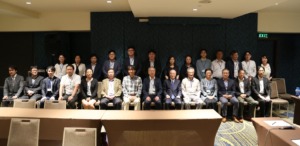
The opening ceremony started at 9:30 AM on January 10. According to His Excellency Jose Castillo Laurel V, ambassador of the Philippines to Japan and keynote speaker of AFC5, the growing uncertainties in Asia amid global issues require the collaboration among leading experts in Asia. “The challenges we face today are both complicated and interrelated. These require out-of-the-box thinking and multi-disciplinary approaches,” he said. “The perspectives that engineering, medicine, management, the social sciences, and the humanities can bring to the table are essential for tackling the world’s problems,” HE Laurel added.
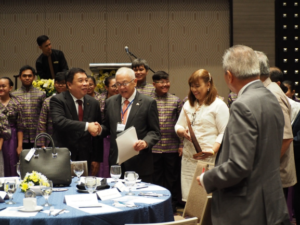
Present during the conference were University of the Philippines (UP) President Danilo L. Concepcion and UPLB Chancellor Fernando C. Sanchez, Jr., who both cited the importance of collaboration in addressing the challenges of globalization and internationalization in Asia. “Collaboration efforts such as this conference are crucial towards sustainable shared growth,” noted UP Pres. Concepcion. “Cooperation is the way to go.” Chancellor Sanchez, on the other hand, remarked: “It is really important that as scholars and policymakers, we must work together in finding sound and sustainable solutions to Asia’s enduring and emerging development challenges.”
A number of UPLB’s academic leaders and scholars were featured in AFC5 discussions.
Dr. Ferdinand C. Maquito, a faculty member of CPAf and an alumnus of the AISF scholarship, noted in his opening talk how AFC has evolved from what was initially a discussion on shared growth and later on sustainability to include efficiency, equity, and environment. Dr. Maquito is also an alumnus of the Master of Science in Industrial Economics (MSIE) program of the School of Economics (SEC) of UA&P and a former faculty member of the Center for Research and Communication (CRC, forerunner of UA&P). CPAf Dean Rolando T. Bello, Dr. Jose V. Camacho, Jr., and Dr. Josefina T. Dizon co-headlined the panel discussion of AFC5. Dean Bello highlighted climate change, environmental stability, and rapid technological developments as the main problems that can be addressed by convening the conference. Dr. Camacho, dean of the Graduate School, identified the six pillars of sustainable growth, which are implementing incentives in the economy to change the behavior of business and regulate profits, creating strong institutions, creating and implementing inclusive policies, infrastructure development, innovation, and interdisciplinary collaboration. For her part, Dr. Dizon, faculty member and former dean of CPAf, contextualized the goals of shared growth from the community development perspective and explained how the decisions formed by the global community can affect the local communities.
Joining them in the panel discussion were Arch. Michael V. Tomeldan, a faculty member of the UP Diliman College of Architecture, and Dr. Peter Lee U, Vice Dean of the University of Asia and the Pacific School of Economics. Arch. Tomeldan talked about how regional centers can be enabled and empowered to achieve decentralization of development through concentration of resources, increasing connectivity among regions through communication and transport, and reducing vulnerabilities to natural hazards such as typhoons and earthquakes. Dr. Peter Lee U, for his part, discussed parallels between the goals of sustainable shared growth and the energy trilemma. “Technology can be a way out,” he said. “With better technology and investment in infrastructure, we could produce more. We could produce forwards and outwards so we could have more of everything with the same resources.” Gracing the conference were His Excellency Koji Haneda, Japanese ambassador to the Philippines; Junko Imanishi, managing director of AISF; and Yasushi Akashi, council member at AISF and AFC5 conference chair.
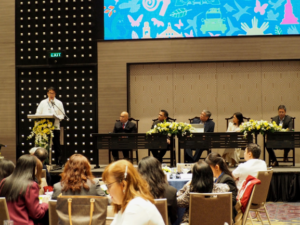
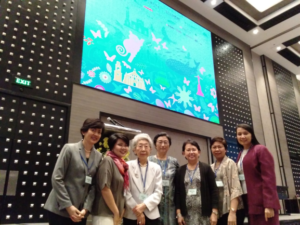
The theme for Roundtable B was “Can Religion Stop the Tyranny of the Market Economy?” with the keynote speech delivered by Dr. Bernardo M. Villegas, Vice President of the Board of Trustees of UA&P. Dr. Villegas emphasized that the global economy is faced with increased inequality within national economies and between the highly developed countries and the emerging markets that are still trying to attain sustainable and inclusive development. In addition to rampant corruption in the public sector, there is little concern for the common good among those who are on top of business organizations. There are not enough people in business who consider it their obligation to contribute to the common good of society, which is defined in ethical terms as a social or juridical order that enables every single member of society to attain his or her integral human development. A major reason for these inequalities is the absence of ethical practices among both the government officials and the leading industrial leaders in both developed and developing economies. This roundtable invited theologians and economists from the Philippines, Indonesia, and Thailand to discuss the successes and failures of economic thought and religious systems in Southeast Asia in an increasingly multi-sectoral and multi-cultural economy.
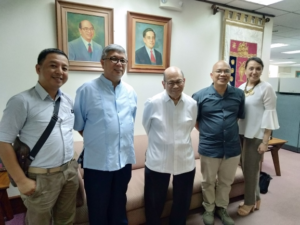
On January 11, the participants boarded onto buses to depart for the one-hour journey to UPLB, which is located at the foot of Mt. Makiling in Laguna province. The sprawling campus is home to the College of Forestry and Natural Resources, the main venue for the second day of the conference. Roundtable B and 40 sessions were held, and lunch was served in the Botanical Garden.
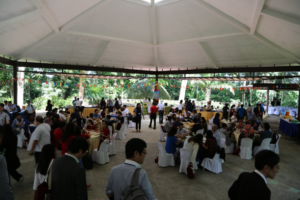
In total, 50 sessions were held and 173 presentations were given, six of which came from CRC and the UA&P School of Economics. The Best Papers and Best Presentation from each session was selected by the sessions’ two chairpersons and were awarded during the Closing Ceremonies held at the National Arts Center in Los Baños. Three of the 50 best presentation awards were given to Shiloh Laciste (MSIE alumna), Ella Leonida (graduate student of MSIE), and Nikka Pesa (SEC instructor).
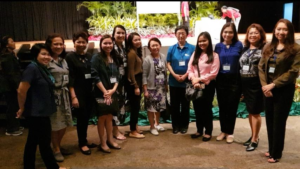
References:
Arana, Jessa Jael S. (2020) “UPLB-hosted AFC 5 tackles sustainable shared growth for Asia” (https://uplb.edu.ph/all-news/uplb-hosted-afc-5-tackles-sustainable-shared-growth-for-asia/ Accessed January 31, 2020)
Imanishi, Junko (2020) “The 5th Asia Future Conference Report” Report Submitted to the Sekiguchi Global Research Association. (http://www.aisf.or.jp/sgra/english/ Accessed January 31, 2020)
Note: This article was part of the lineup for the May 2020 issue of Universitas, which aimed to tackle the importance of dialogues. The magazine had to be modified, however, due to the coronavirus pandemic.
Leave a Reply